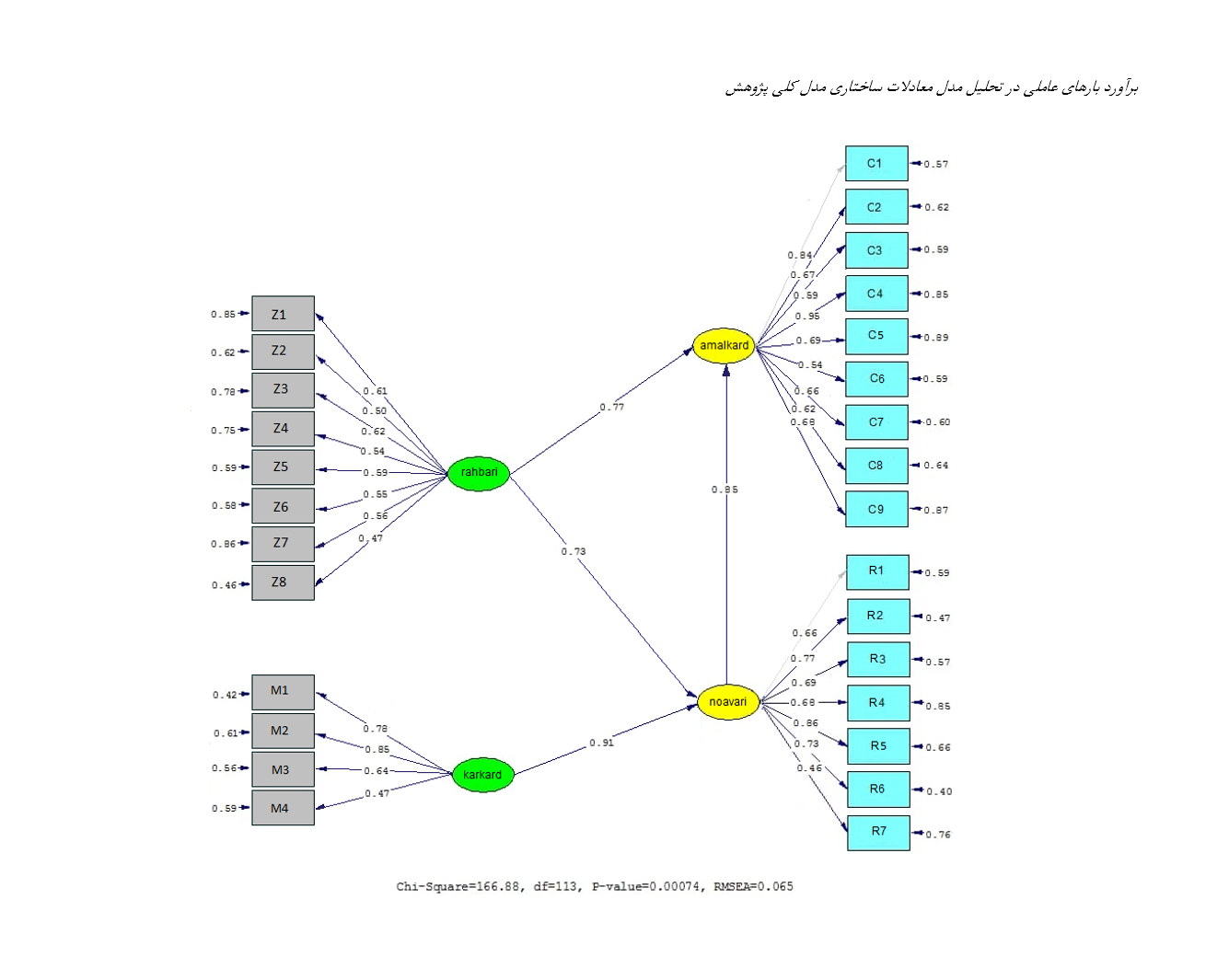Transition of the pharma supply chain towards intelligent sustainability according to the effect of circular supply chain practices in Industry 4.0 and transformational leadership
Abstract
Resource depletion and climate change are forcing business managers to transform towards intelligent sustainability-based models, and the pharmaceutical industry is no exception. With the aid of management approaches and technologies of industry 4.0, it is possible to become efficient with least costs, while considering environmental and social principles. Based on these issues, the present study provides some important findings. First, circular economy practices are effective on technological innovation in Industry 4.0. Industry 4.0 technologies increase the efficiency of circular economy practices. Second, innovation technology is positively related to supply performance from a sustainability perspective. Finally, by relying on the transformational style and creating plans, a way to change towards sustainability and sustainable creation can be gained. Hence, the study provides a deeper understanding of the concepts of the circular economy and Industry 4.0 technologies and provides insights into ways to improve intelligent sustainable performance in the current digital age. The statistical population of the current research is various pharmaceutical companies such as buying companies (Exir, Alborz Daro, Caspian Tamin, etc.), raw materials producer (Sina Glass Company) and glass pharmaceutical company that are related to the supply of upstream and downstream products, and this makes the present study comprehensive.
References
Abu-Bakar, H., Charnley, F., Hopkinson, P., & Khedmati Morasae, E. (2024). Towards a typological framework for circular economy roadmaps: A comprehensive analysis of global adoption strategies. Journal of Cleaner Production, 140066, https://doi.org/10.1016/j.jclepro.2023.140066.
Allahviranloo, T., Hosseinzadeh Lotfi, F., Moghaddas, Z., & Vaez-Ghasemi, M. (2024). Decision Making in Healthcare Systems. Publisher of Springer Cham, eBook ISBN 978-3-031-46735-6, https://doi.org/10.1007/978-3-031-46735-6.
Asadi, S.,Pourhashemi, S.O. , Nilashi, M., Abdullah, R., Samad, S., Yadegaridehkordi, E., Aljojo, N., & Razali, N.S. (2020). Investigating influence of green innovation on sustainability performance: A case on Malaysian hotel industry. Journal of Cleaner Production, 258, 120860, https://doi.org/10.1016/j.jclepro.2020.120860.
Belkhir, L., & Elmeligi, A. (2019). Carbon footprint of the global pharmaceutical industry and relative impact of its major players. Journal of Cleaner Production, 214, 185-194, https://doi.org/10.1016/j.jclepro.2018.11.204.
Chauhan, C., Parida, V., & Dhir, A. (2022). Linking circular economy and digitalization technologies: A systematic literature review of past achievements and future promises. Technological Forecasting and Social Change, 177, 121508, https://doi.org/10.1016/j.techfore.2022.121508.
Chen, P., & Dagestani, A.A. (2023). What lies about circular economy practices and performance? Fresh insights from China. Journal of Cleaner Production, 416, 137893, https://doi.org/10.1016/j.jclepro.2023.137893.
Ching, N.T., Ghobakhloo, M., Iranmanesh, M., Maroufkhani, P., Asadi, S. (2022). Industry 4.0 applications for sustainable manufacturing: a systematic literature review and a roadmap to sustainable development. Journal of Cleaner Production, 334(2):130133, https://doi.org/10.1016/j.jclepro.2021.130133.
Dervishaj, A., & Gudmundsson, K. (2024). From LCA to circular design: A comparative study of digital tools for the built environment. Resources, Conservation and Recycling, 200, 107291, h https://doi.org/10.1016/j.resconrec.2023.107291.
Ghobakhloo, M. (2020). Industry 4.0, digitization, and opportunities for sustainability. Journal of Cleaner Production, 252, 119869, https://doi.org/10.1016/j.jclepro.2019.119869.
Govindan, K. (2023). How digitalization transforms the traditional circular economy to a smart circular economy for achieving SDGs and net zero. Transportation Research Part E, 177, 103147, https://doi.org/10.1016/j.tre.2023.103147.
Habibi, A., Kolahi, B. (1401). Structural equation modeling and factor analysis. Tehran: University Jihad, second edition.
Hanif, S., Ahmed, A., & Younas, N. (2023). Examining the impact of Environmental Management Accounting practices and Green Transformational Leadership on Corporate Environmental Performance: The mediating role of Green Process Innovation. Journal of Cleaner Production, 414, 137584, https://doi.org/10.1016/j.jclepro.2023.137584.
He, B., Cai, H., Ji, Y. & Zhu, S. (2023). Supply Chain Green Manufacturing and Green Marketing Strategies under Network Externality. Sustainability, 15, 13732. https://doi.org/10.3390/su151813732.
Jantian, N., Zandiyeh, M., Alam Tabriz, A., & Rabia, M. (2018). Presenting the optimization model of sustainable drug distribution network and using multi-objective evolutionary algorithms to solve it (case of: Daropakhsh Distribution Company). Production and Operations Management, 10(1 (18)), 133-153.
Johnson&Johnson (2023). Delivering more sustainable products and solutions. https://www.jnj.com/environmental-sustainability/products-and-solutions, Last Retrieved by 27.01.2024.
Karmaker, C.L., Aziz, R.A., Ahmed, T., Misbauddin, S.M., & Moktadir, A. (2023). Impact of industry 4.0 technologies on sustainable supply chain performance: The mediating role of green supply chain management practices and circular economy. Journal of Cleaner Production, 419, 138249, https://doi.org/10.1016/j.jclepro.2023.138249.
Kayani, M., Ardakani Andalib, D., Zare Ahmadabadi, H., Mirfakhredini, S.H. (1402). An analysis of the enablers effective on the implementation of the circular economy and Industry 4.0 in the supply chain. Industrial Management Studies, 21(70), 10.22054/jims.2023.71900.2835.
Khan, M. T., Idrees, M. D., Rauf, M., Sami, A., Ansari, A., & Jamil, A. (2022). Green supply chain management practices’ impact on operational performance with the mediation of technological innovation. Sustainability, 14, 3362. https://doi.org/10.3390/su14063362.
Kitsis, A.M., & Chen, I.J. (2021). Do stakeholder pressures influence green supply chain Practices? Exploring the mediating role of top management commitment. Journal of Cleaner Production, 36, 128258, https://doi.org/10.1016/j.jclepro.2021.128258.
Kumar, A., Choudhary, S., Garza-Reyes, J.A., Kumar, V., Rehman Khan, S.A., & Mishra, N. (2023). Analysis of critical success factors for implementing Industry 4.0 integrated circular supply chain – moving towards sustainable operations. Production Planning & Control, 34:10, 984-998, https://doi.org/10.1080/09537287.2021.1980905.
Kusi, M., Zhao, F. , & Sukamani, D. (2021), Impact of perceived organizational support and green transformational leadership on sustainable organizational performance: a SEM approach, Business Process Management Journal, 27 (5), 1373-1390, https://doi.org/10.1108/BPMJ-09-2020-0419.
Lieder, M., & Rashid, A. (2016). Towards circular economy implementation: a comprehensive review in context of manufacturing industry. Journal of Cleaner Production, 115, 36–51, https://doi.org/10.1016/j.jclepro.2015.12.042.
Mondal, S., Singh, S., & Gupta, H. (2023). Green entrepreneurship and digitalization enabling the circular economy through sustainable waste management - An exploratory study of emerging economy. Journal of Cleaner Production, 422, 138433, https://doi.org/10.1016/j.jclepro.2023.138433.
Müller, S.D., Konzag, H., Nielsen. J.A., Sandholt, H.B. (2024). Digital transformation leadership competencies: A contingency approach. International Journal of Information Management, 75, 102734, https://doi.org/10.1016/j.ijinfomgt.2023.102734.
Neligan, A., Baumgartner, R.J., Geissdoerfer, M., & Schöggl, J.P. (2022). Circular disruption: Digitalisation as a driver of circular economy business models. Business Strategy and the Environment, 32(3), https://doi.org/10.1002/bse.3100.
Pwc (2023). The Extended Producer Responsibility (EPR) in Europe. https://www.pwc.ch/en/insights/sustainability/the-extended-producer-responsibility.html, Last Retrieved by 25.01.2024.
Rehman Khan, S.A., Umar, M., Asadov. A., Tanveer, M., & Yu, Z. (2022). Technological Revolution and Circular Economy Practices: A Mechanism of Green Economy. Sustainability, 14(8), 4524; https://doi.org/10.3390/su14084524.
Said, Z., Sharma, P., Thi Bich Nhuong, Q., Bora, B.J., Lichtfouse, E., Khalid, H.M., Luque, R.G., Phuong Nguyen, X., & Tuan Hoang, A. (2011). Intelligent approaches for sustainable management and valorisation of food waste. Bioresource Technology, 377, https://doi.org/10.1016/j.biortech.2023.128952
Sapkota, B., & Pariatamby, A. (2023). Pharmaceutical waste management system – Are the current techniques sustainable, eco-friendly and circular? A review. Waste Management, 168, 83-97, https://doi.org/10.1016/j.wasman.2023.05.052.
Sazvar, Z., Zokaee, M., Tavakkoli-Moghaddam, R., Al-sadat Salari, S., & Nayeri , S. (2022), Designing a sustainable closed-loop pharmaceutical supply chain in a competitive market considering demand uncertainty, manufacturer’s brand and waste management. Business Analytics and Operations Research, 315, 2057–2088, https://doi.org/10.1007/s10479-021-03961-0.
Schiuma, G., Schettini, E., Santarsiero, F. and Carlucci, D. (2022), The transformative leadership compass: six competencies for digital transformation entrepreneurship, International Journal of Entrepreneurial Behavior & Research, 28(5), 1273-1291, https://doi.org/10.1108/IJEBR-01-2021-0087.
Schroeder, P., Anggraeni, K., & Weber, U. (2018). The Relevance of Circular Economy Practices to the Sustainable Development Goals. Journal of Industrial Ecology, 23(1), 77-95, https://doi.org/10.1111/jiec.12732.
Sepahi, T., Shahbazi, M., & Shafiei Roudpashti, M. (2019). Drug distribution system in Iran: a multi-method study of harms and solutions. Health Image Scientific Research Quarterly, (4) 11, 324-343, doi: 10.34172/doh.2020.41.
Silva, A.C., Marques, C.M., & de Sousa, J.P. (2023). A simulation approach for the design of more sustainable and resilient supply chains in the pharmaceutical industry. Sustainability, 15(9), https://doi.org/10.3390/su15097254.
Silvestre, B.S., Tîrca, D.M. (2019). Innovations for sustainable development: moving toward a sustainable future. Journal of Cleaner Production 208:325-332, https://doi.org/10.1016/j.jclepro.2018.09.244.
Suhandi, V., Chen, P.S. (2023). Closed-loop supply chain inventory model in the pharmaceutical industry toward a circular economy. Journal of Cleaner Production, 383, 135474, https://doi.org/10.1016/j.jclepro.2022.135474.
Tahmasabi, H. A., & Hami, M. (2018). Analyzing the resilience and sustainability criteria of the supply chain in the pharmaceutical industry using the interpretive structural analysis method. Scientific Research Quarterly of Standard and Quality Management, 9(34).
Zhang, A., Wangb, J.X., Farooquec, M., Wangd, Y., & Cho, T.M. (2021). Multi-dimensional circular supply chain management: A comparative review of the state-of-the-art practices and research. Transportation Research Part E 155, 102509, https://doi.org/10.1016/j.tre.2021.102509.

Downloads
Published
Submitted
Revised
Accepted
Issue
Section
License
Copyright (c) 2025 The Decision Science and Intelligent Systems

This work is licensed under a Creative Commons Attribution-NonCommercial 4.0 International License.






